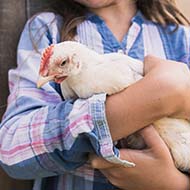Chicken research grants available for vet nurses and students

“Chickens are now a popular pet choice in the UK, which means it’s increasingly likely that one will be brought into your practice for diagnosis and treatment" - Steve Smith.
The British Hen Welfare Trust (BHWT) is encouraging veterinary students and nurses to apply for grants worth up to £3,000 for research into the welfare and behaviour of chickens.
Six grants have been made available by charity, of which one is co-funded by BSAVA PetSavers, the charitable arm of the BSAVA.
Organisers hope the grants will build evidence and enhance veterinary knowledge to increase the quality of welfare and longevity of pet hens.
Steve Smith, EBVS European Veterinary Specialist in Avian Medicine and Surgery, called on vet students and nurses to apply for the grants and improve hen health among the profession.
“Chickens are now a popular pet choice in the UK, which means it’s increasingly likely that one will be brought into your practice for diagnosis and treatment,” he said.
“We all know that the veterinary curriculum doesn’t cover these birds extensively, so anything that can enhance knowledge among our colleagues can only be a positive thing. And if you’re planning to specialise in avian medicine, taking on a funded research project like this could be a great experience.”
BHWT founder Jane Howorth MBE added: “Hen keepers often find there is a lack of treatment options specifically for chickens, and with more people discovering the joy of pet hens, this is an issue that’s not likely to disappear soon.
“As a charity, we’re dedicated to improving pet hen health in numerous ways and these grants will go a long way to providing more support for the nation’s hen keepers and plugging the research and knowledge gap around these beautiful birds.”
Applications for the grants will remain open until 15 July 2022. The BHWT Grant Committee will consider all applications before submitting a shortlist to a Scientific Research Committee.
For more information and to apply, visit bhwt.org.uk



 The latest
The latest